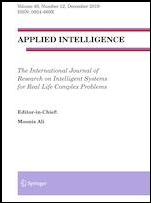
Applied Intelligence (APIN) - March 2019, issue 3 论文列表
| 点击这里查看 Applied Intelligence 的JCR分区、影响因子等信息 |
| 卷期号: March 2019, issue 3 |
| 发布时间: |
| 卷期年份: 2019 |
| 卷期官网: https://link.springer.com/journal/10489/volumes-and-issues/49-3 |
本期论文列表
Programming model-based method for ranking objects from group decision making with interval-valued hesitant fuzzy preference relations
Content-aware point-of-interest recommendation based on convolutional neural network
Adaptive illumination normalization via adaptive illumination preprocessing and modified weber-face
Feature selection based on conditional mutual information: minimum conditional relevance and minimum conditional redundancy
A study on novel filtering and relationship between input-features and target-vectors in a deep learning model for stock price prediction
Influence maximization on signed networks under independent cascade model
Design of fuzzy radial basis function neural network classifier based on information data preprocessing for recycling black plastic wastes: comparative studies of ATR FT-IR and Raman spectroscopy
An improved firework algorithm for hardware/software partitioning
Transfer of learning with the co-evolutionary decomposition-based algorithm-II: a realization on the bi-level production-distribution planning system
A computer-aided diagnosis system using Tchebichef features and improved grey wolf optimized extreme learning machine
On repeated stackelberg security game with the cooperative human behavior model for wildlife protection
A novel hybrid score level and decision level fusion scheme for cancelable multi-biometric verification
A chaotic teaching learning based optimization algorithm for clustering problems
Improving awareness in early stages of security analysis: A zone partition method based on GrC
TKEH: an efficient algorithm for mining top-k high utility itemsets
Multiobjective optimal control for wastewater treatment process using adaptive MOEA/D
Improving lazy decision tree for imbalanced classification by using skew-insensitive criteria
A new block matching algorithm based on stochastic fractal search
Ensemble based fuzzy weighted extreme learning machine for gene expression classification
A new method for feature selection based on intelligent water drops
ERR.Rank: An algorithm based on learning to rank for direct optimization of Expected Reciprocal Rank
Context-aware pedestrian detection especially for small-sized instances with Deconvolution Integrated Faster RCNN (DIF R-CNN)

